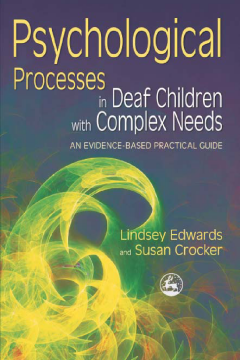
BOOK
Psychological Processes in Deaf Children with Complex Needs
Lindsey Edwards | Susan Crocker | Marschark
(2007)
Additional Information
Book Details
Abstract
`This volume offers a broad perspective on psychological processes in children with complex needs. Armed with this valuable tool, professionals, parents, and educators will be much better prepared to offer deaf and hard of hearing children the support and opportunities they deserve.'
- from the Foreword by Marc Marschark
Psychological Processes in Deaf Children with Complex Needs is a concise and authoritative guide for professionals working with deaf children and their families.
The effects of hearing impairments on learning, social development and family life can be profound. They can impact on attachment, parenting and family interaction, and can affect cognitive and neuropsychological processes including perception and memory.
This guide draws on the latest evidence to explain the impact of hearing impairment and uses case studies to focus on the key issues for assessment and intervention. It also suggests practical strategies for treatment and development for those working with hearing impaired children.
Lindsey Edwards, PhD, MSc, has previously worked at the Nuffield Hearing and Speech Centre, Royal National Throat, Nose and Ear Hospital, and the Whittington Hospital Health Psychology Service, UK. She is currently Clinical Psychologist at the Great Ormond Street Hospital for the Children Cochlear Implant Programme and Ear, Nose and Throat Service. Susan Crocker, MSc, is Consultant Clinical Psychologist working with children and families at the Donald Winnicott Centre, Child Development Service, City and Hackney Teaching Primary Care Trust, UK, and was Clinical Psychologist at the Nuffield Hearing and Speech Centre, Royal National Throat, Nose and Ear Hospital, UK, for 10 years.
Table of Contents
| Section Title | Page | Action | Price |
|---|---|---|---|
| Prelims (Figures, Tables, Boxes, Acknowledgments) | |||
| Executive summary | |||
| 1. Introduction | |||
| 2. Methodology and conceptual framework | |||
| 3. Country sketches | |||
| 4. Findings from the country studies | |||
| 5. Conclusions and recommendations | |||
| Back Matter (Annexes) |
